
Sponsored Ads
|
Articles by this Author
»
(E) The Atlantic Connection-Article by Anand Samy
|
The Atlantic Connection-Article by Joel Anand Samy
From the Adriatic Institute for Public Policy and World Development and Empowerment
On the eve of President Bush's visit to Europe, Joel Anand Samy was asked to write for the Atlantic Connection, a monthly publication and e-newsletter of the American Legislative Exchange Council (ALEC) in Washington, DC, USA: http://www.alec.org
April 2005 THE ATLANTIC CONNECTION
Issue 6
Joel Anand Samy is President of World Development and Empowerment-USA and co-founder of the Adriatic Institute for Public Policy in Croatia and the annualized International Leaders Summit. As an American he has been actively involved in the Balkan region since 1995. Anand Samy spent over 10 years in the business arena as VP of Jonathan and David Inc, and Treasurer of Jonathan and David Foundation and executive at Zondervan, division of HarperCollins Publishers.
Nearly $2.5 trillion a year in transatlantic commerce signifies just one of the important reasons to review current efforts in strengthening this vital strategic relationship. A strengthened transatlantic relationship is essential to both continents and among pro-active groups engaged in this arena, ALEC’s leadership and its unique mission are fundamental in affirming this strategic alliance and advancing free market ideas. ALEC’s mission and tireless efforts are commendable.
The pure economic reasons are compelling enough for business, political and think tank leaders and policymakers on both sides of the Atlantic to focus on promoting liberty, free markets and limited government. These foundational goals will further strengthen mutual efforts to win the war on terrorism, address challenges in the Balkans and the Middle East and tackle other economic and political issues. In furthering the cause of liberty, public policy players from continental Europe, the UK and US will soon meet in Zagreb, Croatia to discuss advancing and advocating free market reforms. The second International Leaders Summit in June 2005 will advocate tax reform – namely the case for the flat tax – and will present a unique time in history when leaders from both sides of the Atlantic can benefit from the laboratories of reform such as America’s welfare reform and private sector initiatives, privatization in the UK and the tax revolution sweeping across Eastern Europe.
At this time, we should also take practical steps to strengthen transatlantic relations, namely:
· Affirm US-European goals to promote free trade and prosperity
· Embrace evidences and experiences of bold reforms in the Eastern Europe on tax reform & social security as vital tools for policymakers in Western Europe & the US
· Focus on strengthening the rule of law in former communist states and combating corruption, a major hurdle to economic growth
· Strengthen the battle against terrorism through sustained cooperation & commitment
· Invest in strategic transatlantic initiatives that advance Jeffersonian principles
In conclusion, an interesting historical fact is that the Republic of Dubrovnik, formerly Ragusa in Croatia was the first state to formally recognize the United States of America. And in 1992, the US recognized Croatia’s independence from the former Yugoslavia. Through America’s leadership, NATO intervened and brought freedom to individuals in the post-communist Balkan region and began the long process of securing peace and stability. America’s commitment to freedom in securing the peace on the European continent on three occasions during the last century remind us all of the significance of securing peace, advancing freedom and strengthening transatlantic relations. These are goals worth pursuing.
The entire newsletter from ALEC is enclosed via attachment.
The Adriatic Institute for Public Policy
International Leaders Summit
www.ils-wde.org
|
»
(E) Americans are on the road again - to Croatia
|
Americans are on the road again The dollar has held up better against some national currencies outside the euro-zone, making a beach vacation in, sayCroatia, more reasonable than one just across the Adriatic in Italy
Summer travel: Fares, room rates spike
For the first time since 9/11, the peak travel season looks to be hitting on all cylinders.
May 4, 2005: 9:48 AM EDT
By Les Christie, CNN/Money staff writer
NEW YORK (CNN/Money) - The message from the travel industry this spring: Americans are on the road again.
"Despite terrorist threats, fuel price rises, and a weak dollar," says Amy Ziff, roving editor for Travelocity, "Americans feel free to travel again, especially to Europe, where they've been going in increasing numbers."
According to the European Travel Commission, a record 14 million Americans will visit Europe this year, surpassing the 13.5 million who ventured there in 2000.
This is good news for the travel industry. For travelers, though, heightened demand has pushed up prices across the board.
An annual AAA survey of domestic travel costs reports that per diem prices are up 5 percent over last year. The story is even worse overseas. The dollar has lost 6 percent of its value against the euro, and that doesn't account for other price increases.
So far, high fuel prices have had little impact on fares, but just last week American Airlines announced it would add fuel surcharges of $5 a ticket for domestic flights, more for international ones. Other airlines will likely follow suit.
Hotels prices are up already. John Walsh, spokesman for Marriott International, reports that average daily rates (ADRs) at Marriott (domestic and international) are up an average of 7 percent this year. The AAA reports that domestic lodging for a family of four costs nearly 4 percent more this year and now average $129 a night.
Lower room inventories also means chains offer fewer bookings to such Internet bidding sites as Priceline.com.
"When the economy was not doing well you could find great rates there," says Walsh. "Now, it's hard to find bargains."
Heavy demand for airline seats and hotel rooms has many travel professionals advising vacationers to book well in advance. Procrastinators may have to pay more or settle for an inconvenient flight.
In the past, prices tended to drop as the departure dates grew near as airlines scrambled to fill empty seats. This year, prices are rising as travelers compete for scarce berths.
Sean Comey, spokesman for AAA of Northern California, Nevada, and Utah, reports that the best air deals are available 90 to 120 days in advance. He himself was stung by not booking early; it cost him an extra $300 each for two cruise tickets because he waited too long.
Ultimately, vacationers may have a tough time finding big savings this year, but that will not necessarily discourage the search.
"Some travelers are such bargain hunters," says Ziff, "that if the price is $25 different between Paris and Rome, they change their destination."
Savings strategies
Pay in dollars. The dollar's weakness has proved a boon for companies offering European tours and cruises. Americans can pay in dollars for a complete package. Other than shopping, they incur few other expenses -- or surprises.
Explore alternatives to the euro-zone. The dollar has held up better against some national currencies outside the euro-zone, making a beach vacation in, say Croatia, more reasonable than one just across the Adriatic in Italy. U.S. neighbors Mexico and Canada are comparative bargains.
Stay at business hotels. Comey says some destination cities in the United States are more affordable than many realize, compared with many of the country's main tourist centers such as Las Vegas and Orlando. San Francisco, for example, has many excellent hotels that charge less than $150 a night. In cities that cater to business travelers, downtown hotels lure leisure travelers with generous weekend rates.
Travel to off-season destinations. You can save on summer travel by staying at winter resorts. "Many ski reports have great summer programs," says Ziff, "with terrific facilities and wilderness at your door, but much less expensive than in ski season."
Use the Internet to plan and book. Travel planning online continues to grow in popularity; nearly 45 million Americans booked at least one service on the Internet last year, according to the Travel Industry Association (TIA).
Ziff says Travelocity, like other online vendors, offers what she calls "dynamic packages." These take advantage of excess inventory at hotels or airlines, who will sometimes offer rooms or airplane seats in bulk to Travelocity at a much lower prices than those they advertise to the public.
Trends for 2005
Educational excursions. Many Americans are opting for vacations that incorporate learning. Literary tours, anthropological travel -- even cooking lessons -- are all gaining popularity.
Short trips. A three-day weekend can refresh and renew almost as well as a week off. These are perfect for the hard-charging executives who just can't tear themselves away from their responsibilities.
Getting the family together. Family reunions account for an increasing share of travel. The TIA reports that 34 percent of Americans have traveled to a family reunion in the past three years. But increasingly, families are not just getting together, they're traveling together.
Multigenerational travel takes several forms: Three generations may tour or cruise together, rent out a house as a family, or settle in en masse at a resort. Such trips enable everyone to "vacation at our own speed, but come together for meals," says Ziff.
http://money.cnn.com/2005/05/02/pf/travel_summer_trends_2005/
|
»
(E) Soccer World Cup tickets sold out for Croatia
|
Soccer World Cup tickets sold out for Croatia
LONDON, May 8 (IranMania) - There are no longer World Cup tickets available for some 24 countries, among them Iran, Brazil, Germany, Argentina, Italy, France, Netherlands and England, the vice-president of the 2006 World Cup Organizing Committee, Wolfgang Niersbach, announced in Frankfurt on Saturday.
"Tickets for 13 countries were sold out at the end of the first phase. As of midday Tuesday, tickets are no longer available for 11 more nations," Niersbach said.
At the current time, the following 24 team series are sold out:
Argentina, Australia, Brazil, Croatia, Czech Republic, Ecuador, England, Spain, France, Germany, Greece, Iran, Ireland, Italy, Japan, Mexico, Netherlands, Paraguay, Poland, Portugal, USA, Switzerland, Sweden and Ukraine.
However tickets are still available for some 81 other nations, according to Niersbach.
http://www.iranmania.com/News/ArticleView/Default.asp?NewsCode=31646&NewsKind=Sport
|
»
(E) 60 Years of Victory Medal to president Mesic
|
60 Years of Victory in the Great Patriotic War
Medals to political figures who fought against fascism President of Croatia, Stepan Mesic, received the medal
MAIN WWII VICTORY FESTIVITIES START IN MOSCOW
11:36
MOSCOW, May 8 (RIA Novosti) - This Sunday main festivities devoted to Victory Day (60th anniversary of the end of WWII) are commencing in Moscow. The CIS summit, which is to start its work at noon Moscow time in the form of a working meeting, will be the first event. After that, the heads of the CIS states will meet in the square in front of the Bolshoi Theater with the veterans of the Great Patriotic War (1941-1945) from Russia and other CIS countries. The square is famous as the place where war veterans traditionally gather every year on the eve of the Victory Day celebrations. After that, the CIS leaders will attend a festive concert to be held for war veterans on the new stage of the Bolshoi.
This Sunday most foreign guests are arriving in Moscow, including Chairman of the People's Republic of China Hu Jintao, Germany's Chancellor Gerhard Schroeder, President of France Jacques Chirac, Prime Minister of Japan Junichiro Koizumi, Prime Minister of India Manmohan Singh, and also US President George Bush whom President Vladimir Putin is expected to meet this evening.
A Victory Parade will be held at 10:00 a.m. in Red Square on May 9, the main day of the celebrations.
After the parade, the invited leaders of foreign states will lay wreaths at the Tomb of the Unknown Soldier near the Kremlin wall together with the Russian leadership.
At noon, a festive reception will be held on behalf of Vladimir and Lyudmila Putin in the State Kremlin Palace on the occasion of the 60th anniversary of the victory in the Great Patriotic War. Both war veterans and the leaders of foreign delegations have been invited to this reception.
During the reception, a ceremony will be held to award the medals "60 Years of Victory in the Great Patriotic War" to war veterans, foreign guests, and also to political figures who fought against fascism. Thus, the medals will be given to President of Greece Karolos Papoulias (who participated in the resistance movement in Greece in 1943-1944), President of Albania Alfred Moisiu, President of Croatia Stepan Mesic, Wojciech Jaruzelski (former President of Poland, a participant in the Great Patriotic War), Glafkos Kliridis (former President of Cyprus, a war participant and military pilot), and former king of Romania Mihai I Hohenzollern.
The heads and members of foreign delegations are planned to hold numerous meetings within different formats on May 9. The leaders of various countries will hold bilateral meetings. The President of Russia will hold a series of tete-a-tete meetings with his colleagues from other states.
Also, a Middle East quartet (UN, Russia, U.S. and EU) meeting is scheduled for May 9.
Despite that, all foreign guests and war veterans will gather again in Red Square in the evening. At 20:00 Moscow time, a minute of silence will be held to commemorate the war victims.
After that, an impressive show will be held to reproduce the history of the Great Patriotic War and its main episodes. The festivity will end with a concert of pop stars and big fireworks.
On Tuesday, May 10, a Russia-EU summit will be held in the Grand Kremlin Palace.
http://en.rian.ru/russia/20050508/39949427.html
|
»
(E) City of Split was founded 1,700 years ago
|
Split, Croatia 1700th year celebration 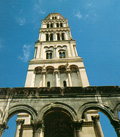
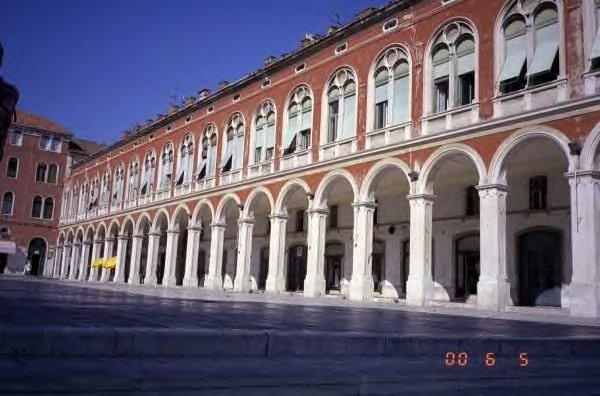
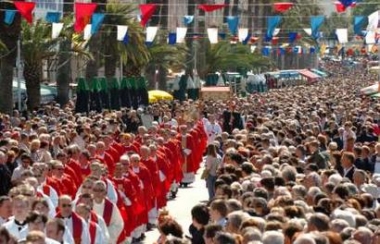
Thousands of people gather for the traditional annual celebration of Saint Duje in Adriatic port of Split, Croatia, May 7, 2005. The city was founded 1,700 years ago by Roman Emperor Diocletian who ordered the killing of bishop Duje, later known as Saint Duje, the patron of Split city. REUTERS/Matko Biljak
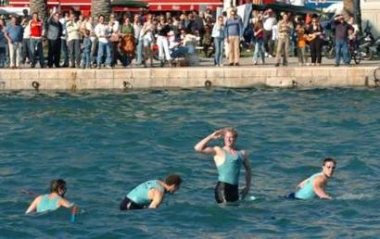
A member of the Cambridge rowing team salutes the crowd while their boat sinks in Split city waterfront, Croatia, May 7, 2005. The team participated in a race with Oxford to mark the 1700 anniversary of Split. REUTERS/Matko Biljak
|
»
(E) Croatia and Jewels of the Adriatic at the Waldwick Public Library
|
"Croatia and Jewels of the Adriatic" at the Waldwick Public Library
BERGEN COUNTY BRIEFS
Friday, May 6, 2005
LITTLE FERRY - The borough held its annual "Mayor for a Day" program Tuesday, with 16 eighth-graders from Memorial School conducting town business and voting on agenda resolutions under the guidance of council members.
Students took the oath of office for a variety of roles, including mayor, council members, and borough administrator.
Students in the program were Carly Scibetta, Lina Martinez, Erik Garcia, George Mikhail, Freddy Vasquez, Eunhwa Mouada, Christine Gaul, Barbara Martinez, Samantha Rivas, Jessica Ortiz, Kathryn Stout, Kubra Kalkan, Priscilla Periut, Patrick Ryan, Samia Souza and Kavan Panchal.
- John A. Gavin
WALDWICK - Travel consultants Jim and Alix Morriss will present "Croatia and Jewels of the Adriatic" at the Waldwick Public Library on June 2 at 7 p.m.
The slide lecture is an armchair traveler's tour of Croatia's dramatic coastline along the Adriatic Sea.
Among the highlights of the program are Kotor, the old maritime center of Montenegro; the picturesque city of Dubrovnik, notable for its medieval double walls and fortifications; and the lush Ionian island of Corfu, written about by Homer in "The Odyssey."
The program is free and open to the public. Registration is recommended. For more information, call (201) 652-5104.
- Allison Pries
http://www.northjersey.com/page.php?qstr=eXJpcnk3ZjczN2Y3dnFlZUVFeXk1MCZmZ2JlbDdmN3ZxZWVFRXl5NjY5MDE2MSZ5cmlyeTdmNzE3Zjd2cWVlRUV5eTI=
|
»
(E) Nancy Lucey - My parents were immigrants from Croatia
|
My parents were immigrants from Croatia Moms' closets hold life's lessons
By CHRISTINE COX
Tribune Staff Writer
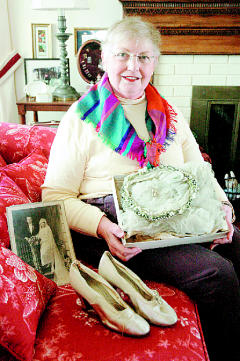
Nancy Lucey of South Bend was amazed to discover her mother's wedding veil and shoes, as well as wedding photographs of her parents, while cleaning out their house after their deaths. Her mother, Nancy, whose maiden name was Stipulin, married Lucey's father, Joseph Brozovich, in 1925.
Tribune Photo/BARBARA ALLISON

Darlene Johnson and Shannon Stuart with Levi, 3 months. Shannon hired a private investigator to find her mother's birth mother.
Tribune Photo/SANTIAGO FLORES
A frosting flower from a decades-old wedding cake. Strappy high heels stacked in their boxes. A life lesson in giving even when you have next to nothing.
Mothers' closets held them all.
In honor of Mother's Day, The Tribune invited readers to share stories of their mothers' closets, jewelry boxes and other places moms claim as their own. The 11 women who responded had childhoods wealthy enough for nannies and poor enough for only one family closet. One story revolves around a dance band; another is tied to an oval window.
In every piece, the writers cherish the discoveries they made about their mothers, themselves and life through a closet door. Here is the first:
Romance and love were two words not frequently mentioned in my childhood home. My parents were immigrants from Croatia who worked diligently to provide for my two older brothers and me. Tasks were completed because it was expected of us.
It wasn't until my parents had died, Mom in 1978 and Dad in 1987, and I was cleaning out their home, that I thought about them as young people in love. In a box in an upstairs closet, I was startled to find my mother's wedding veil, her shoes, and a remarkably preserved wedding cake flowerette made of frosting.
In another box, I found their wedding pictures. Here they were young, beautiful people celebrating their marriage with friends and relations. My mother was wearing the wedding gown she had sewn herself. My father was dapper in a black suit with white bib and tie, a small boutonniere tucked in his jacket.
I sat back, when I found the box, to think about my parents as young people in the blush of love. My mother was 35 when I was born, my father 40. I had only known them when they were middle-aged and older, working constantly.
-- Nancy Lucey of South Bend on her late mother, Nancy Brozovich
http://www.southbendtribune.com/stories/2005/05/08/local.20050508-sbt-FULL-A1-Moms__closets_hold_l.sto
|
»
(E) They sing it in Croatian, but they don't understand a single word
|
They sing it in Croatian, but they don't understand a single word
Observer-Reporter
Saturday, April 30, 2005
Visit reveals traditions of Cokeburg to Croatian reporter
By Lada Kalmeta
COKEBURG – "I'm crying, my dear mother ... I'm crying because
he first kissed me, but then he left me ..."
Tens of voices sing this song loudly and emotionally in this
little Washington County town. The song is written in the
Croatian language and they sing it in Croatian, but they don't
understand a single word. People from Cokeburg sing hundreds
of Croatian songs, and during every performance they seem to
understand perfectly every word they sing, but it is not so.
"They wrote down words of every song and they learned it by
heart. But they never ask for the meaning of those words. They
just sing. They love it," says Marlene Luketich-Kochis, who
leads this Cokeburg group of singers. Members of the group
don't only sing, they perform their ethnic dance and play
instruments called "tamburitza." The word tamburitza is
Croatian; there is no English translation for it, as
tamburitza was invented in Croatia and brought to the United
States almost two centuries ago.
Immigrants left the coal towns in this area after all the coal
was mined. By 1950, all coal mines in Cokeburg were already
closed, but this town, inhabitated by Croatian immigrants and
their descendants, still exists. People didn't leave Cokeburg.
Now, 705 inhabitants live there, and the average age of
residents is 42, which proves that many young people with
children have made the decision to stay here.
Why is it not the case in any other coal towns?
If we say that people in Cokeburg carry on old Croatian
traditions by playing tamburitza and singing old national
songs, we still haven't reached the only real reason why they
still populate Cokeburg. The fact is that they maintain
customs which in Croatia are already forgotten. They are the
only group of Croatians in the whole world who keep certain
rituals, particularly with respect to St. George. Moreover,
because only Cokeburg people keep these traditions, Croatian
people from all over the United States – and even from other
parts of the world – come to Cokeburg to participate in
special ceremonies.
Cokeburg resident Marlene Luketich-Kochis, in back,
recently shows her collection of Croatian costumes and
dresses to Lada Kalmeta, a Croatian reporter interning
with the Observer-Reporter. (STAN DIAMOND/O-R)
"This is the reason why Cokeburg is full of life," explains
Bernard Luketich, the mayor of Cokeburg. "Croatian people came
here before World War I only from one region in Croatia,
around the town named Ogulin. There is a village near Ogulin,
called Zagorje Ogulinsko, and particularly from that village
came the most people in Cokeburg in those early years. Today
in Zagorje Ogulinsko in Croatia, everything changed, and they
didn't keep old traditional habits. We did, so Cokeburg became
the host town for people from all over the U.S. who originally
came from Ogulin and from Zagorje, and they are coming to
Cokeburg to participate in our common celebration."
The celebration of St. George takes place in Cokeburg every
year on April 23 and 24, when Americans and Canadians who
trace their ancestry to Ogulin, Zagorje Ogulinsko and other
Croatian villages come to Cokeburg. The celebration, with old
Croatian costumes and old rituals, the procession and the
blessing of a special cake in the church cannot be seen
anywhere else in the world, not even in Croatia anymore.
"In our club in Cokeburg, where we dance, sing and play
tamburitza, we have people from 5 to 85. Everybody must learn
to play tamburitza and to sing Croatian songs, although they
don't know the language. That keeps us together, and that
marks us as the only Croatian descendants who take care about
tradition, forgotten everywhere. There are other Croatian
unions in the U.S., but they don't practice this 'old way,'"
Luketich said.
American and Croatian flags fly above the house of
Bernard Luketich in Cokeburg. (STAN DIAMOND/O-R)
The church in Cokeburg is closed. People from Cokeburg, who
are all religious, have to go to the church in Bentleyville,
even for the most important celebration when they host
hundreds of people in Cokeburg. The church in Cokeburg closed
more than 10 years ago, by the order of the bishop in
Pittsburgh.
There is no school in Cokeburg, either. Children from the
borough go to school six miles away.
But their tradition is kept so strong in their hearts, and
they practice it so diligently in everyday life, that this
little "miracle" of a town will continue to exist in spite of
those troubles. Cokeburg will continue to host not only
hundreds of Croatian descendants from the United States and
Canada who love to be a part of Cokeburg's celebrations, but
also many other Americans who like their folklore and who also
sing Croatian songs perfectly, without understanding one
single word.
Lada Kalmeta is a reporter for the newspaper Slobodna
Dalmacija in Zadar, Croatia. She just wrapped up three weeks
at the Observer-Reporter as part of a training program for
journalists from southeastern Europe, funded by the U.S.
Department of State.
© 2005 Observer Publishing Co.Washington, PA
http://www.observer-reporter.com/286767025108036.bsp
|
»
(E) Croatia: Foreign Investors Council Presents Its Objectives
|
CROATIA: Foreign Investors Council Presents Its Objectives
2005-05-04 15:38:26
The Foreign Investors Council, an association of foreign companies investing in Croatia, presented its objectives on Tuesday, citing the fight against corruption, formulation of private investment policy and improvement of public and private management as its priorities.
The Council president, Carlsberg Croatia Director Jorn Pedersen, said that it was necessary to improve the investment and business climate in Croatia by establishing a competitive legal system, flexible labour regulations and providing support to production rather than to import.
The Council will analyse the investment situation in Croatia and compare it with other countries and will annually publish a list of priorities and recommendations in its White Book.
Pedersen pointed out that the Council would be apolitical and unbiassed in developing good relations with the government and interest groups without taking sides.
The Council's mission is to contribute, together with the ruling structures, to creating a better investment environment for foreign and domestic companies through open informal dialogue among interested parties, he said.
The Council was founded by pharmaceutical company AstraZeneca, British American Tobacco, Carlsberg Croatia brewery, real estate company Colliers International, gas producer Messer Croatian Plin, audit and consulting firm PricewaterhouseCoopers, pharmaceutical company Hoffman la Roche, and consumer goods producer Unilever Croatia.
Pedersen announced cooperation with the Organisation for Economic Cooperation and Development (OECD) and the European Round Table of Industrialists (ERT), a forum of 45 European industrial leaders, including some of Europe's most powerful companies such as Fiat, Volvo, MOL and Nestle. The latter body, he added, has substantial influence on the views of Brussels on economic issues, and the Council will present it with the results of its analyses.
The Council will also cooperate with other such councils in Southeast Europe and with economic missions at embassies, national chambers of commerce, private sector groups and the Business Advisory Council of the Stability Pact in order to encourage foreign investment and overcome difficulties that may arise in relations with foreign investors.
Source: Hina News Agency
http://www.seeurope.net/en/Story.php?StoryID=55316&LangID=1
|
»
(E) Croatian president launches Optima Telekom
|
Croatian president launches Optima Telekom Optima Telekom signs first cooperation agreements
Telecom Paper , Netherlands - 5 hours ago
Croatia’s new fixed telephony operator Optima Telekom has signed two business and technical cooperation agreements with the country’s postal service.
Croatia has great potential for developing information technology and telecommunications.
|
|
|